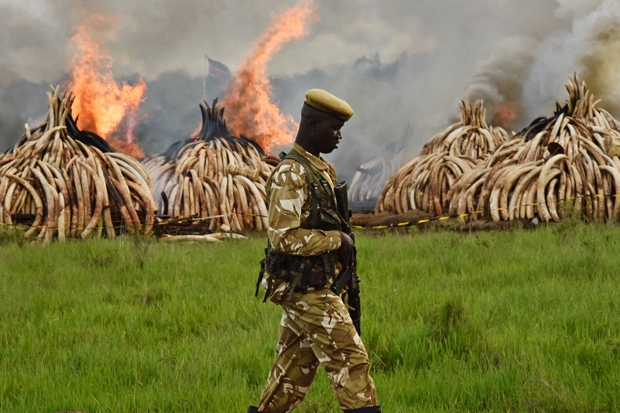To mark World Environment Day this Sunday, Angola will celebrate its zero-tolerance approach to the illegal wildlife trade — the third biggest illegal trade after drugs and arms. Angolans are seeking to rebuild their shattered elephant population in the face of the relentless trade in ivory. But the debate is marked by sharply opposing views, which tend to be centred on such spectacular stunts as the burning of government stockpiles of elephant tusks.
Last month saw the greatest sacrifice of ivory there has ever been. Uhuru Kenyatta, president of Kenya, ignited a pyre 10 ft high and weighing more than 100 tons. Its assembly required the deaths of 6,700 elephants. That’s a lot of money going up in flames, smouldering for a good week until it’s destroyed. No one can calculate exactly how much because the black market in ivory is huge.
The United Nation Convention on Trade in Endangered Species outlawed the international ivory trade in 1989. Yet Botswana, Namibia and Zimbabwe have all negotiated permission to sell large quantities to Japan and China: 105 tons in 2008. Other nations have sought an unambiguous ban.
It was Kenya that led the way in ivory-burning. The first burn was in 1989. The story goes that Richard Leakey, Kenya’s head of conservation, sought the help of a special-effects expert from Hollywood and created the bonfire with inflammable glue and jet fuel. It burned a treat — and, crucially, got noticed. The sacrifice of a few million dollars caught the world’s imagination. Although some said the ivory should have been sold to benefit elephants, or the poor, the government’s refusal to profit from the actions of criminals was seen as a fine thing.
Since then 21 countries have destroyed more than 26 tons of ivory. But it hasn’t stopped the illegal trade. Figures from 2014 suggest that 96 elephants are being killed a day. Between 1979 and 1989 it’s estimated that the total world population of elephants fell from 1.3 million to 600,000. Birth rate lags behind the rate of poaching.
Ivory used to be a staple of civilisation: knife and fork handles, billiard balls and piano keys were made of ivory until about 1930. So it’s best not to get too pious about countries that still have a flourishing internal trade in ivory, such as China and Japan. There it is a status symbol like the watches advertised in this magazine, and with increasing wealth, status symbols become more democratic. And organisations such as Campfire of Zimbabwe have put forward starkly rational views about wildlife as a financial resource.
But wildlife conservation is not a purely fiscal matter. There is a strong emotional element. Tourists are always desperate to see an elephant and we seek them out of love, not rationality. The fact that the Kenyan government expresses its feelings for elephants by sacrificing ivory can be seen as good business. Tourism is the country’s second largest earner after agriculture.
Some economists have claimed that ivory burns are counterproductive. They create scarcity, drive up the price and so encourage the poachers to greater efforts. Others complain that such symbolic sacrifices serve no useful purpose — though they do show that government ministers aren’t selling off the stockpile on the QT, which sends out a strong anti-corruption message.
Our shock at ivory burns is also a statement of increasing opposition to any trade in ivory whatsoever. Pro-burn partisans seek to make the entire trade stink in the nostrils of right-thinking people everywhere. And the more that attitude spreads into the end-user countries, the sooner the illegal trade will cease. Education, of course, is the ultimate solution. The trade has already declined in Japan, and China has also signalled its intention to phase out domestic trade in ivory.
As so often in wildlife conservation, scarcity brings about a change in public attitude: the closer elephants get to extinction, the more the world wants to save them. We don’t want elephants to become extinct. We want to see elephants in the wild because an encounter with an elephant is a profound experience. But some of us also want to own and caress and possess stuff made from their tusks because ivory is great. Or was great.
This is not a wholly rational business — so wholly rational solutions are not the whole answer. The squandering, reckless burns of ivory have an emotional impact that may yet help us preserve the world’s elephants. But ultimately, the best argument for elephant conservation is not a sacrifice or a political gesture or a rational cost-benefit analysis. The best argument for elephants is a living elephant. The closer the elephant, the more powerful the argument.






Comments